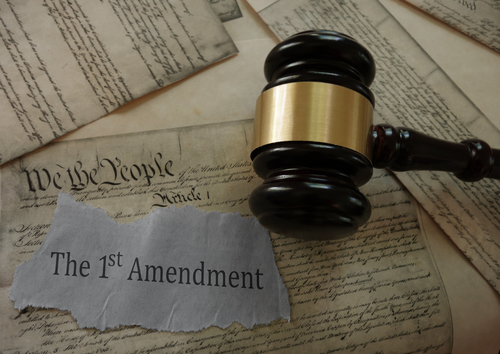We have a Constitutional right to express ourselves on social media, right? Social media is the new public square, a traditional public forum, right? Not so fast…
Generally true. But there are narrow situations where a court may lawfully restrict social media use. A 16-year-old juvenile defendant found this out that hard way in a California case known only as “The People v. A.A.”
The Facts of the Case
Initially, A.A. was convicted of felony battery with serious bodily injury. He had an altercation with a youth basketball instructor who had scheduled time on a court that A.A. was using. After being asked to leave several times, A.A. became angry, and he battered the coach to the ground. The coach needed stitches and had permanent scarring..
During court proceedings, A.A. posted social media photos of court documents and a video of himself dancing in front of the courthouse to music. When the judge later asked him about these actions, he stated he had a lot of Instagram followers who care about what he is doing.
Ultimately, his sentence included a ban on him discussing his case on social media. It also required him to remove previous posts.
A.A. agreed to the condition at the time. However, he later filed an appeal, which contended the condition was overbroad and violated his First Amendment rights.
Did the Probation Condition Violate His First Amendment Rights?
The California case evoked last year’s U.S. Supreme Court case of Packingham v. North Carolina, another appeal involving allegations of First Amendment violation.
In Packingham, the Supreme Court reviewed a North Carolina statute that bars sex offenders from accessing social networking websites where minors are permitted. Otherwise, they will face felony charges. Reasonable? No. The high court described social media platforms as the new public square, where free speech has enjoyed maximum protections.
The Supreme Court’s opinion was that “with one broad stroke” the North Carolina statute removed access to principal sources of news, employment ads, and participation in the modern public square – indefinitely. The opinion went on to state that, “Foreclosing access to social media altogether thus prevents users from engaging in the legitimate exercise of First Amendment rights.”
A note of import: the law still permits an array of restrictions to convicted felons who undergo court-ordered supervision, either through parole or probation. When an offender has served the sentence, those restrictions are typically lifted.
So, if social media is the new town square, then why can’t A.A. speak freely there?
Well, the California court found that the primary goal of the juvenile system is to provide an opportunity to reform and rehabilitate a minor. The idea is that minors will come to understand and respect the rights of others before they are adults and face stronger consequences for failing to do so.
The fact is, juvenile court has broad discretion in deciding how conditions may be applied to reform and rehabilitate. The California court noted that, judging by the appellant’s words and actions throughout trial and afterward, he viewed his conduct as “a springboard for braggadocio on the internet.”
The court reasoned that A.A.’s attempt to entertain his followers in this way during trial was:
- an abuse of the public forums,
- disrespectful to the court, and
- capable of causing the victim embarrassment.
This restriction will endure only while A.A. is on probation. In the meantime, the narrowly-tailored conditions of his probation still allow A.A. freedom to express himself via other means – telephone, mail, and in-person contact, for instance. Marks Gray and I represent news organizations and people interested in obtaining public records and involved in publishing who want to stay within the law. If you have any questions about these issues, please contact me at 904-807-2179 or [email protected].
